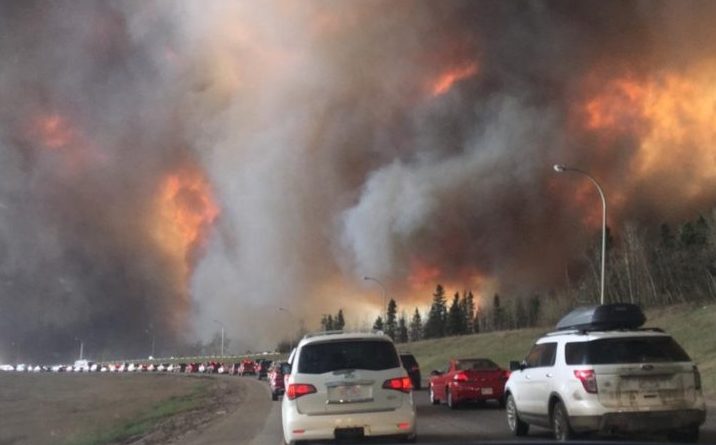Forest Fires: Effects of Global Warming
Photo by DarrenRD / CC- BY-SA 4.0
Jenny Yeoh-Wang | May 27, 2016
For several years, scientists have warned that global warming may contribute to an increased risk of wildfires (1). Now, it appears as though these predictions are being realized (1). In Canada, the Fort McMurray wildfire has been burning for more than three weeks. Over 2,000 firefighters are still battling the fire, which “remains out of control” and currently covers an estimated 566,188 hectares (equivalent to over 2,100 square miles) (2). The fire has led to a mandatory evacuation order that forced more than 88,000 people to withdraw from Fort McMurray and the neighboring areas, and residents are not expected to be allowed to return to Fort McMurray until June 1st (2, 3). The manager of Fort McMurray’s wildfire, Chad Morrison, said, “We expect weeks, if not months, fighting this fire in the forested areas” (4).
Global warming is suspected to be at least partially responsible for extending the wildfire season in Canada, the United States, and abroad: warmer weather, the earlier melting of snow, and drying trees leave forests more vulnerable to wildfires and enable fires to occur for longer periods of the year (1, 3). In 2015, Alberta, the province in which Fort McMurray is located, and Manitoba had double their 25-year average number of fires, and this year, their wildfire season began a month earlier than usual (5).
In addition, global warming leaves forests more vulnerable to invasive insects that thrive in the warmer weather. Such insects can strip leaves from, weaken, and eventually kill trees (6). In Alaska, the spruce beetle is one invasive species that has devastated 3,900 square miles of forest (6).
Humans have also directly contributed to damaging forests through activities such as logging. Mining and drilling for fossil fuels also encroaches upon forests, and the presence of workers for these operations leads to increased activity that can prompt fires (1).
Normally, forests help offset humans’ emissions of carbon dioxide, a greenhouse gas emitted by the burning of fossil fuels. However, when destroyed by fires and insects, forests release carbon dioxide back into the atmosphere—contributing to global warming and making forests even more vulnerable (1). Additionally, soot from wildfires darkens the surface of ice, causing it to absorb more heat from the sun and melt faster (1). Soot from northern fires has contributed to the melting of Greenland’s ice sheet, which could raise the sea level by 20 feet if it entirely dissolves (1).
The residents of Fort McMurray are all too familiar with the destruction and chaos that forest fires can wreak on livelihoods, homes, and wildlife. The repercussions of such devastation may linger for many years. It behooves us to be mindful of the potential contributions of global warming to forest fires and the devastating consequences of such blazes.
References:
- Gillis, J., & Fountain, H. (2016, May 10). Global Warming Cited as Wildfires Increase in Fragile Boreal Forest. The New York Times. Retrieved from http://www.nytimes.com/2016/05/11/science/global-warming-cited-as-wildfires-increase-in-fragile-boreal-forest.html
- Kassam, A. (2016, May 15). Canada wildfire: why a sleeping giant awoke in Alberta and became relentless. The Guardian. Retrieved from http://www.theguardian.com/world/2016/may/15/alberta-wildfire-the-beast-fort-murray-canada
- Government of Alberta. (2016, May 25). Update 24: 2016 Wildfires (May 25 at 4:30 p.m.). Retrieved from http://www.alberta.ca/release.cfm?xID=41701E7ECBE35-AD48-5793-1642C499FF0DE4CF
- Mertz, E. (2016, May 24). Fort McMurray wildfire: ‘We expect weeks, if not months, fighting this fire’. Global News. Retrieved from http://globalnews.ca/news/2718970/fort-mcmurray-wildfire-we-expect-weeks-if-not-months-fighting-this-fire/
- Richtel, M. & Santos., F. (2016, April 12). Wildfires, Once Confined to a Season, Burn Earlier and Longer. The New York Times. Retrieved from http://www.nytimes.com/2016/04/13/science/wildfires-season-global-warming.html
- United States Environmental Protection Agency. (2016, February 23). Climate Impacts on Forests. Retrieved from https://www3.epa.gov/climatechange/impacts/forests.html


Does anyone still pray to God for divine intervention for ending these fires? I believe we should.